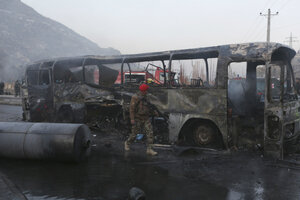Is Islamic State penetrating Afghanistan? Rumors swirl.
The self-described Islamic State has few cultural or ideological affinities with the Taliban. Scattered reports of its presence appear to have more to do with local militant rifts.

In this file photo taken Dec. 13, 2014, an Afghan soldier inspects a damaged bus at the site of a suicide attack by the Taliban in Kabul, Afghanistan. The Taliban remain the region's most prominent insurgency, though recently, rumors have swirled about Islamic State getting a foothold in the country. Most observers say it does not pose a threat at the moment.
Rahmat Gul/AP/File
Kabul, Afghanistan
A new militant group may be forming in Afghanistan’s long-restive Helmand Province during the quiet winter months when the Afghan insurgency traditionally regroups.
Mullah Abdul Rauf, a Soviet-era fighter and Taliban member who was at one time a Guantánamo Bay detainee, is reportedly building a militia loyal to the Islamic State, the notoriously brutal group now in control of northern Syria and western Iraq. Farther north in central Afghanistan’s Logar Province, locals say fighters are already flying the black flag of IS.
Any new IS presence here is still mostly rumored; no accounting exists for its scale or projection. Yet scattered reports of the emergence of black-clad Afghans with IS ties have led to speculation that the feared international jihadist group may gain a foothold in Afghanistan, as Al Qaeda did in the late 1990s.
Many local analysts doubt, however, that IS will establish Afghan strongholds in the near future. Its supposed lure is being pegged to rifts among local fighting groups, and as an effort by local militants to attract attention by presenting themselves as close to powerful new jihadi groups.
“I don’t think that there are any real ideological connections here with IS because [local fighters] have yet to meet an IS leaders. I don’t see any interaction between them,” says Rahimullah Yusufzai, a Pakistani journalist and terrorism expert who has interviewed Osama bin Laden and Mullah Omar.
In Helmand, local government officials investigated, and say they’ve found no evidence that Mullah Rauf has any links with IS. He is attempting to recruit fighters for his own militia after reportedly falling out of favor with the Taliban.
“It’s not a big concern for us. They are former Taliban and we’ve always been fighting them and we’ll continue to fight them if they form a new movement. So far there hasn’t been a change in security because of him,” says Farid Obaid, spokesman for the Afghan police in Helmand.
At least a couple dozen Afghans have appeared fighting alongside IS in the Middle East. But for most Afghan militants, the ongoing fight against the government appears to be taking priority over traveling abroad. Within Afghanistan, aligning with IS would provide unclear benefits. And within the region, Al Qaeda is a much stronger draw.
“We have gathered some reports that some members of the Afghan and Pakistani Taliban have announced allegiance to ISIS in [the Pakistani region of] Waziristan. We are analyzing these reports to see how this affiliation is taking place or if they have any link to ISIS in Iraq and Syria,” says Sediq Sediqqi, spokesman for the Ministry of Interior.
Opportunistic militants?
In Logar Province, local officials dismiss those waving IS flags and scrawling pro-IS graffiti as doing little more than making a show of solidarity, or using the name to appear stronger.
“The IS people are here, but they are not the real ISIS people. They just changed their flags from white to black. They haven’t had any attack on government forces yet,” says Brig. Gen. Abdul Hakim Ishaqzai, police chief in Logar. “Since IS is becoming more popular around the world, these guys also want to change and swap their sides to get more attention.”
And groups claiming to be IS may pose the biggest threat to the Taliban, not the government, simply by creating rival militias.
For Abdulhaq, a farmer in Logar who is accustomed to militants operating in his area, those with self-proclaimed ties to IS aren’t an immediate threat. He worries what might happen if they adopt more than the superficial name and flag of IS.
“We are very concerned that these people have started behaving like ISIS supporters because we’re hearing that the actual ISIS group is very cruel and has massacred people in some countries. In the future, if these guys obey orders from the real IS group, it will create more problems for people,” he says.

